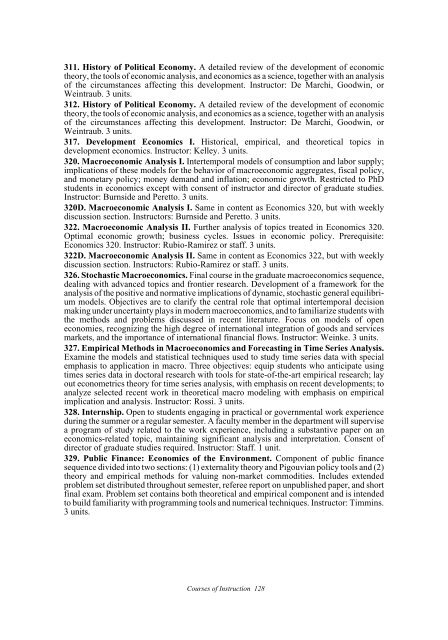Duke University 2008-2009 - Office of the Registrar - Duke University
Duke University 2008-2009 - Office of the Registrar - Duke University
Duke University 2008-2009 - Office of the Registrar - Duke University
You also want an ePaper? Increase the reach of your titles
YUMPU automatically turns print PDFs into web optimized ePapers that Google loves.
311. History <strong>of</strong> Political Economy. A detailed review <strong>of</strong> <strong>the</strong> development <strong>of</strong> economic<br />
<strong>the</strong>ory, <strong>the</strong> tools <strong>of</strong> economic analysis, and economics as a science, toge<strong>the</strong>r with an analysis<br />
<strong>of</strong> <strong>the</strong> circumstances affecting this development. Instructor: De Marchi, Goodwin, or<br />
Weintraub. 3 units.<br />
312. History <strong>of</strong> Political Economy. A detailed review <strong>of</strong> <strong>the</strong> development <strong>of</strong> economic<br />
<strong>the</strong>ory, <strong>the</strong> tools <strong>of</strong> economic analysis, and economics as a science, toge<strong>the</strong>r with an analysis<br />
<strong>of</strong> <strong>the</strong> circumstances affecting this development. Instructor: De Marchi, Goodwin, or<br />
Weintraub. 3 units.<br />
317. Development Economics I. Historical, empirical, and <strong>the</strong>oretical topics in<br />
development economics. Instructor: Kelley. 3 units.<br />
320. Macroeconomic Analysis I. Intertemporal models <strong>of</strong> consumption and labor supply;<br />
implications <strong>of</strong> <strong>the</strong>se models for <strong>the</strong> behavior <strong>of</strong> macroeconomic aggregates, fiscal policy,<br />
and monetary policy; money demand and inflation; economic growth. Restricted to PhD<br />
students in economics except with consent <strong>of</strong> instructor and director <strong>of</strong> graduate studies.<br />
Instructor: Burnside and Peretto. 3 units.<br />
320D. Macroeconomic Analysis I. Same in content as Economics 320, but with weekly<br />
discussion section. Instructors: Burnside and Peretto. 3 units.<br />
322. Macroeconomic Analysis II. Fur<strong>the</strong>r analysis <strong>of</strong> topics treated in Economics 320.<br />
Optimal economic growth; business cycles. Issues in economic policy. Prerequisite:<br />
Economics 320. Instructor: Rubio-Ramirez or staff. 3 units.<br />
322D. Macroeconomic Analysis II. Same in content as Economics 322, but with weekly<br />
discussion section. Instructors: Rubio-Ramirez or staff. 3 units.<br />
326. Stochastic Macroeconomics. Final course in <strong>the</strong> graduate macroeconomics sequence,<br />
dealing with advanced topics and frontier research. Development <strong>of</strong> a framework for <strong>the</strong><br />
analysis <strong>of</strong> <strong>the</strong> positive and normative implications <strong>of</strong> dynamic, stochastic general equilibrium<br />
models. Objectives are to clarify <strong>the</strong> central role that optimal intertemporal decision<br />
making under uncertainty plays in modern macroeconomics, and to familiarize students with<br />
<strong>the</strong> methods and problems discussed in recent literature. Focus on models <strong>of</strong> open<br />
economies, recognizing <strong>the</strong> high degree <strong>of</strong> international integration <strong>of</strong> goods and services<br />
markets, and <strong>the</strong> importance <strong>of</strong> international financial flows. Instructor: Weinke. 3 units.<br />
327. Empirical Methods in Macroeconomics and Forecasting in Time Series Analysis.<br />
Examine <strong>the</strong> models and statistical techniques used to study time series data with special<br />
emphasis to application in macro. Three objectives: equip students who anticipate using<br />
times series data in doctoral research with tools for state-<strong>of</strong>-<strong>the</strong>-art empirical research; lay<br />
out econometrics <strong>the</strong>ory for time series analysis, with emphasis on recent developments; to<br />
analyze selected recent work in <strong>the</strong>oretical macro modeling with emphasis on empirical<br />
implication and analysis. Instructor: Rossi. 3 units.<br />
328. Internship. Open to students engaging in practical or governmental work experience<br />
during <strong>the</strong> summer or a regular semester. A faculty member in <strong>the</strong> department will supervise<br />
a program <strong>of</strong> study related to <strong>the</strong> work experience, including a substantive paper on an<br />
economics-related topic, maintaining significant analysis and interpretation. Consent <strong>of</strong><br />
director <strong>of</strong> graduate studies required. Instructor: Staff. 1 unit.<br />
329. Public Finance: Economics <strong>of</strong> <strong>the</strong> Environment. Component <strong>of</strong> public finance<br />
sequence divided into two sections: (1) externality <strong>the</strong>ory and Pigouvian policy tools and (2)<br />
<strong>the</strong>ory and empirical methods for valuing non-market commodities. Includes extended<br />
problem set distributed throughout semester, referee report on unpublished paper, and short<br />
final exam. Problem set contains both <strong>the</strong>oretical and empirical component and is intended<br />
to build familiarity with programming tools and numerical techniques. Instructor: Timmins.<br />
3 units.<br />
Courses <strong>of</strong> Instruction 128









